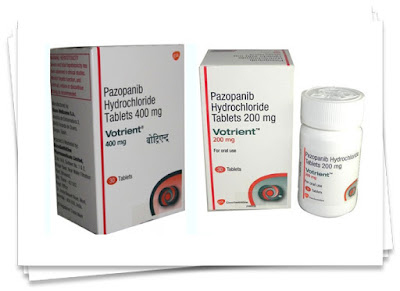Pazopanib(votrient) is specifically a selective multi-targeted receptor TKI (tyrosine kinase inhibitor). This drug is marketed under the brand name Votrient. It prevents the activity of proteins, involved in the growth and spread of cancer cells. The pazopanib 400mg is prescribed for adults to treat:
- advance renal cell carcinoma
- certain forms of soft-tissue sarcoma
Most Common Side Effects of Pazopanib:
- diarrhoea
- feeling or being sick
- stomach pain
- loss of appetite
- weight loss
- loss of taste
- sore mouth
- headache
- tumour pain
- skin rash
- high blood pressure
- feeling weak or tired
- loss of skin pigment
- changes in hair colour
- unusual hair loss or thinning
Tell your doctor or pharmacist if any of these pazopanib side effects becomes troublesome.
Warnings and Precautions:
- The votrient 400 mg can raise your blood pressure, and it should be checked prior to taking this drug and while you are taking it.
- If you're scheduled for an operation, votrient 200 mg should be stopped at least 7 days prior to your operation as it may affect the wound healing.
- The pazopanib 400mg is not prescribed for people aged under 18 and children younger than 2 years of age because of safety concerns.
- Avoid taking pazopanib 200mg with food, as it affects the way the drug is absorbed. Consume it at least a couple of hours following a meal or 1 hour prior to a meal.
- Drinking grapefruit juice should be avoided while you are being treated with the pazopanib tablet as it may increase the chance of side effects.
- Do not take this medication during pregnancy. Notify your doctor if you want to get pregnant.
- Don’t breast-feed while on treatment with this medicine.
- Avoid driving or using machines if you feel weak, dizzy, or tired, or if your energy levels are low.
- Discuss with your doctor prior to taking pazopanib 200mg, if you have heart and liver disease.
How Does Pazopanib Works: This multiple kinase inhibitor mainly acts by limiting the growth of tumor by targeting angiogenesis via inhibition of the enzymes including VEGFR (vascular endothelial growth factor receptor), PDGFR (platelet derived growth factor receptor), c-KIT and FGFR.
How to take Pazopanib: Always take this drug exactly as your doctor has told you. Check with your healthcare professionals if you are not sure.
How much to take: The usual recommended dose is two 400 mg tablets (800 mg pazopanib) consumed once a day. This is the maximum recommended dose per day. Your healthcare provider may need to reduce your dose if you get adverse reactions.
When to take: Don’t take pazopanib together with food. Consume it at least a couple of hours following your meal, or 1 hour prior to a meal.
For instance, you could consume it a couple of hours following breakfast or 1 hour prior to lunch. Consume your pills at about the same time every day.
Tablets should be swallowed whole with the help of water, one after the other. Do not crush or break the tablets as this affects the way the drug is absorbed and may increase the chance of adverse reactions.
If you take more Pazopanib than you should: If you take excess pills, contact a doctor or pharmacist in order to seek the appropriate medical advice.
If you forget to take Pazopanib: Avoid the consumption of double dose in order to make up for a missed or forgotten dose. Just consume your very next dose at about the usual time.
What is the Best Price of Pazopanib: The pazopanib cost will be very reasonable if you choose to buy this medication from any WHO-GDP & ISO certified wholesaler company.

I was diagnosed as HEPATITIS B carrier in 2013 with fibrosis of the
ReplyDeleteliver already present. I started on antiviral medications which
reduced the viral load initially. After a couple of years the virus
became resistant. I started on HEPATITIS B Herbal treatment from
ULTIMATE LIFE CLINIC (www.ultimatelifeclinic.com) in March, 2020. Their
treatment totally reversed the virus. I did another blood test after
the 6 months long treatment and tested negative to the virus. Amazing
treatment! This treatment is a breakthrough for all HBV carriers.